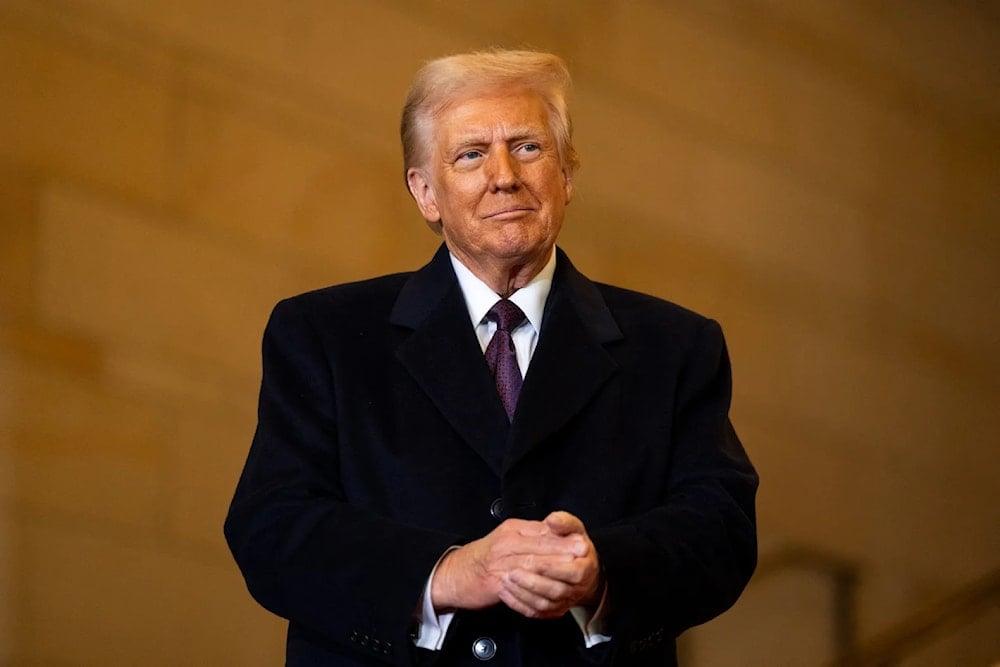Trump’s $230 mln DOJ compensation claim criticized as legally baseless
Legal experts slam Donald Trump’s $230 million DOJ compensation bid over the Mar-a-Lago and Russia probes, calling it frivolous and ethically compromised.
-

US President Donald Trump waits to speak during inauguration ceremonies at the US Capitol in Washington, DC, on January 20, 2025. (AFP)
US President Donald Trump’s attempt to claim $230 million in damages from the Department of Justice over investigations into his 2016 campaign’s alleged links to Russia and the 2022 classified documents search at Mar-a-Lago has been denounced by legal experts as lacking merit and raising serious ethical concerns.
Filed under the Federal Tort Claims Act (FTCA), Trump’s compensation claim stems from what he calls an invasion of privacy, malicious prosecution, and abuse of process. However, legal specialists say the request would likely be dismissed outright if submitted by any other American.
Trump has filed two separate administrative claims totaling $230 million. One relates to the FBI search of his Mar-a-Lago estate for classified documents, and the other pertains to the earlier investigation into potential ties between his 2016 campaign and Russia.
In the Mar-a-Lago case, Trump’s complaint cites $100 million in compensation. An attached memo also demands $100 million in punitive damages and claims $15 million in legal costs, despite those expenses being covered by his Super PAC, Save America. Although the claim form lists $100 million, the accompanying memo totals $115 million, an inconsistency that remains unexplained.
Legal experts: FTCA claim is frivolous
Experts have sharply criticized Trump’s filing under the FTCA. Gregory Sisk, a law professor at the University of St. Thomas in Minnesota, described the request as "absurd."
"Typically, someone asking for this amount of money would be very quickly rejected," Sisk said, adding, "I cannot think of any prior claim settled at this early stage that involves such a sum."
The FTCA allows individuals to seek damages from the federal government, but sets strict limitations, notably excluding punitive damages. "It is a frivolous claim to ask for punitive damages under the FTCA. The statute is explicit," Sisk added.
Rupa Bhattacharyya, a former DOJ attorney with years of experience handling FTCA claims, also noted that high-dollar claims are rarely settled at the administrative level, stressing that "Big-money cases are rarely settled early. Before the government pays taxpayer funds, it must ensure the claim is valid."
She emphasized that successful FTCA settlements typically involve severe, long-term injuries, for example, children requiring lifelong care, not legal disputes over criminal investigations.
DOJ officials overseeing the case raise ethical red flags
Criticism has mounted over the handling of Trump’s $230 million FTCA claim, as both officials with authority to approve settlements over $4 million, Deputy Attorney General Todd Blanche and Associate Attorney General Stanley Woodward, are political allies who previously represented Trump and his aide Walt Nauta.
Former DOJ ethics chief Joseph Tirrell, now suing the department for wrongful termination, warned of unavoidable conflicts of interest, stating, "There’s nobody that can make this decision who isn’t full of ethical conundrums." He added that DOJ staff risk losing their jobs if they oppose the president’s wishes.
While the DOJ insists decisions follow ethics guidance, Tirrell questioned how any career official could act independently under such pressure.
Historically, FTCA settlements are far smaller. Between 2020 and 2024, the average payout was $51,684, with the largest individual settlement at $3.55 million. Trump’s demand is nearly 65 times that figure and even exceeds the $138.7 million paid in total to 139 victims of sexual abuse by USA Gymnastics physician Larry Nassar.
Experts also note that the Mar-a-Lago search followed a judge-approved warrant based on probable cause, making it extremely difficult for Trump to argue he was unlawfully targeted.
Calls to let the courts decide
Bhattacharyya has argued that the DOJ should not respond to Trump’s FTCA request, an option permitted under the law, forcing Trump to take his claim to court, where his arguments would be tested in public and under judicial scrutiny.
"If President Trump wants to press his legal claims in a court of law, let him try, as thousands of tort claimants do every year," she wrote in an essay this week.
"Settling President Trump’s administrative claims before there has been any opportunity to test or defend those claims should be a non-starter for the Department of Justice if it is to retain any integrity, a commitment to doing justice, and a sense of responsibility for the US taxpayer dollars with which they have been entrusted."

 4 Min Read
4 Min Read










